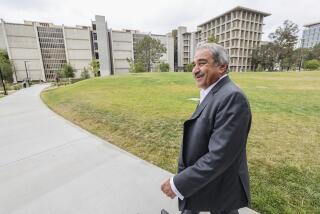UCSD, Scripps Clinic Team Up to Hire Top Scientist
- Share via
In an unusual move to grab a star scientist, UC San Diego and the Research Institute of Scripps Clinic have hired a noted organic chemist to become both a UCSD professor and head of Scripps’ new chemistry department.
Kyriacos C. Nicolaou, 42, will move to the two institutions in September from the University of Pennsylvania. He rejected an offer to join the faculty at Yale University to come to San Diego, said Murray Goodman, a UCSD chemistry professor.
The jointly funded appointment represents an arrangement that is being tried for the first time by UCSD and Scripps. About a dozen Scripps researchers now also hold appointments at UCSD, but they receive no salary from the university, said Marjorie Javet, assistant vice chancellor for academic affairs.
‘Era of Cooperation”
UCSD Chancellor Richard Atkinson said the joint appointment marks “a new era of cooperation” between the university and Scripps.
Charles Edwards, president of the Scripps Clinic and Research Foundation, said he expects Nicolaou to bring “a formidable strength in the development of exciting and beneficial areas of scientific inquiry.”
Nicolaou is recognized in his field as brilliant at conceiving and carrying out new ways of synthesizing complex organic molecules, chemists say.
“That is a phenomenal addition to the strength of organic chemistry in all of Southern California,” said Francois Diederich, associate professor of organic chemistry at UCLA.
In a field constantly in search of new ways of cooking up biological molecules, Nicolaou is a “master chef,” Diederich said. “His work is extremely elegant. It is unpredictably beautiful. That is, it’s not reproductive. His work is always highly original.”
Nicolaou’s work has produced 11 patents. He has concentrated on the synthesis of organic molecules involved in inflammatory processes in the body, and on figuring out how those molecules work to produce pain. Eventually, such work could lead drug companies to develop drugs that can block pain and inflammation better than current drugs do.
Cell-to-Cell Communication
More recently, he has worked on synthesizing other molecules, including a group of molecules that cleave DNA, the chemical blueprint necessary for cell replication. When researchers know better how such compounds work, Nicolaou has written, they might prove useful as “warheads” against the body’s most wildly proliferative cells--cancer.
His recent research also has looked at molecules important in cell-to-cell communication and the body’s production of antibodies.
The joint appointment was a natural outgrowth of the fact that both institutions were interested in Nicolaou, Goodman said. The university’s Chemistry Department first began recruiting him about 2 1/2 years ago, then became aware about a year ago of Scripps’ interest, he said.
Quickly, the situation became one of cooperation rather than rivalry for the same person, Goodman said.
“We have come together because it felt natural,” he said. “It’s not that we did this because we couldn’t do it the other way. It’s that the opportunity presented itself seriously when Scripps and UCSD discovered that we were interested in the same person.”
Nicolaou will bring a research group of more than 20 people to San Diego and will have laboratories at both UCSD and Scripps. Initially, the labs will be in interim quarters. UCSD eventually will house his lab in a new Sciences Building. Construction of the building, next to Urey Hall, is to begin in July, 1990. Scripps has plans for a Center for Chemistry across Torrey Pines Road from its existing facilities. It may be completed as early as August, 1991.
Nicolaou will spend half his time at each institution, each of which will pay about 50% of his salary. At UCSD, his salary will be $57,800, said Paul Croft, administrator for the chemistry department. His graduate students and post-doctoral students will also divide their time between the two institutions, Croft said.
Details about how the two institutions will divide their interests in any patent revenues Nicolaou’s work might generate are not final, but no difficulties are expected.





